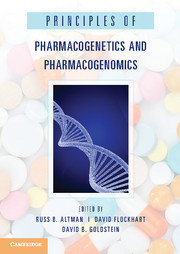Book contents
- Frontmatter
- Contents
- Contributors
- Introduction
- I Critical Concepts
- 1 Introduction to Population Diversity and Genetic Testing
- 2 Genotyping Technologies
- 3 Pharmacokinetics: Absorption, Distribution, Metabolism, Excretion Overview Chapter
- 4 Overview: Adverse Drug Reactions
- 5 PharmGKB, a Centralized Resource for Pharmacogenomic Knowledge and Discovery
- 6 DrugBank
- 7 Ethical Considerations for Pharmacogenomics: Privacy and Confidentiality
- 8 Informed Consent in Pharmacogenomic Research and Treatment
- 9 Legal Trends Driving the Clinical Translation of Pharmacogenomics
- II Therapeutic Areas
- References
7 - Ethical Considerations for Pharmacogenomics: Privacy and Confidentiality
from I - Critical Concepts
Published online by Cambridge University Press: 05 June 2012
- Frontmatter
- Contents
- Contributors
- Introduction
- I Critical Concepts
- 1 Introduction to Population Diversity and Genetic Testing
- 2 Genotyping Technologies
- 3 Pharmacokinetics: Absorption, Distribution, Metabolism, Excretion Overview Chapter
- 4 Overview: Adverse Drug Reactions
- 5 PharmGKB, a Centralized Resource for Pharmacogenomic Knowledge and Discovery
- 6 DrugBank
- 7 Ethical Considerations for Pharmacogenomics: Privacy and Confidentiality
- 8 Informed Consent in Pharmacogenomic Research and Treatment
- 9 Legal Trends Driving the Clinical Translation of Pharmacogenomics
- II Therapeutic Areas
- References
Summary
Discovering how individual genetic variation influences why some people respond to therapeutics but others show little improvement or have serious side effects lies at the heart of the promise of pharmacogenomics to improve health care. Realizing this goal, however, will depend on building a robust infrastructure that supports genomic medicine. These changes include developing affordable and ubiquitous genomic sequencing capability, creating expansive DNA sample sets annotated with detailed phenotypic information, educating health care providers on developments in genomic medicine, integrating diagnostic tools into clinical decision making, and attending to a complex array of social, economic, and ethical concerns that accompany each of these shifts in biomedicine. Achieving these major endeavors will depend on ensuring that the public not only understands the goals of pharmacogenomics, but also that the public actively supports and participates in basic and clinical research.
Public approval of pharmacogenomics research will depend on assurances that the risks will be minimal and that the benefits of its integration into clinical care will result in improved health care. A major issue of concern over the collection, storage, and distribution of human DNA is the risk associated with potential breaches of confidentiality and privacy and the threat of stigmatization and/or discrimination against individuals by insurance companies, employers, and others. The principle of protecting an individual's genetic information in the course of research and/or clinical care is a deeply held principle in the United States. Personal medical history has remained a sensitive and legally protected category of information. The special status of privacy of medical information has led to confidentiality protections as in physician-patient privilege. To attend to these requirements, researchers and health providers must develop strategies that secure individual genetic information and personal medical history that also enable basic and translation research.
- Type
- Chapter
- Information
- Principles of Pharmacogenetics and Pharmacogenomics , pp. 66 - 73Publisher: Cambridge University PressPrint publication year: 2012



